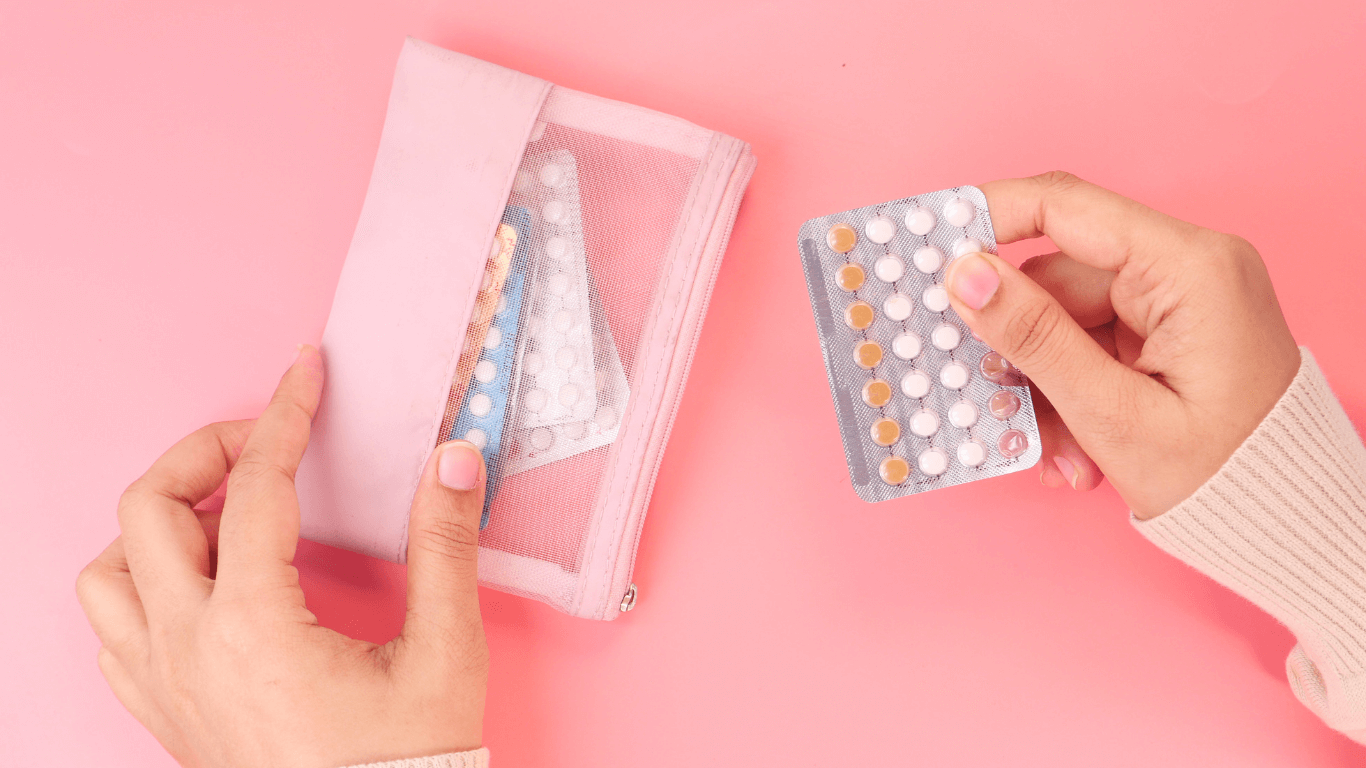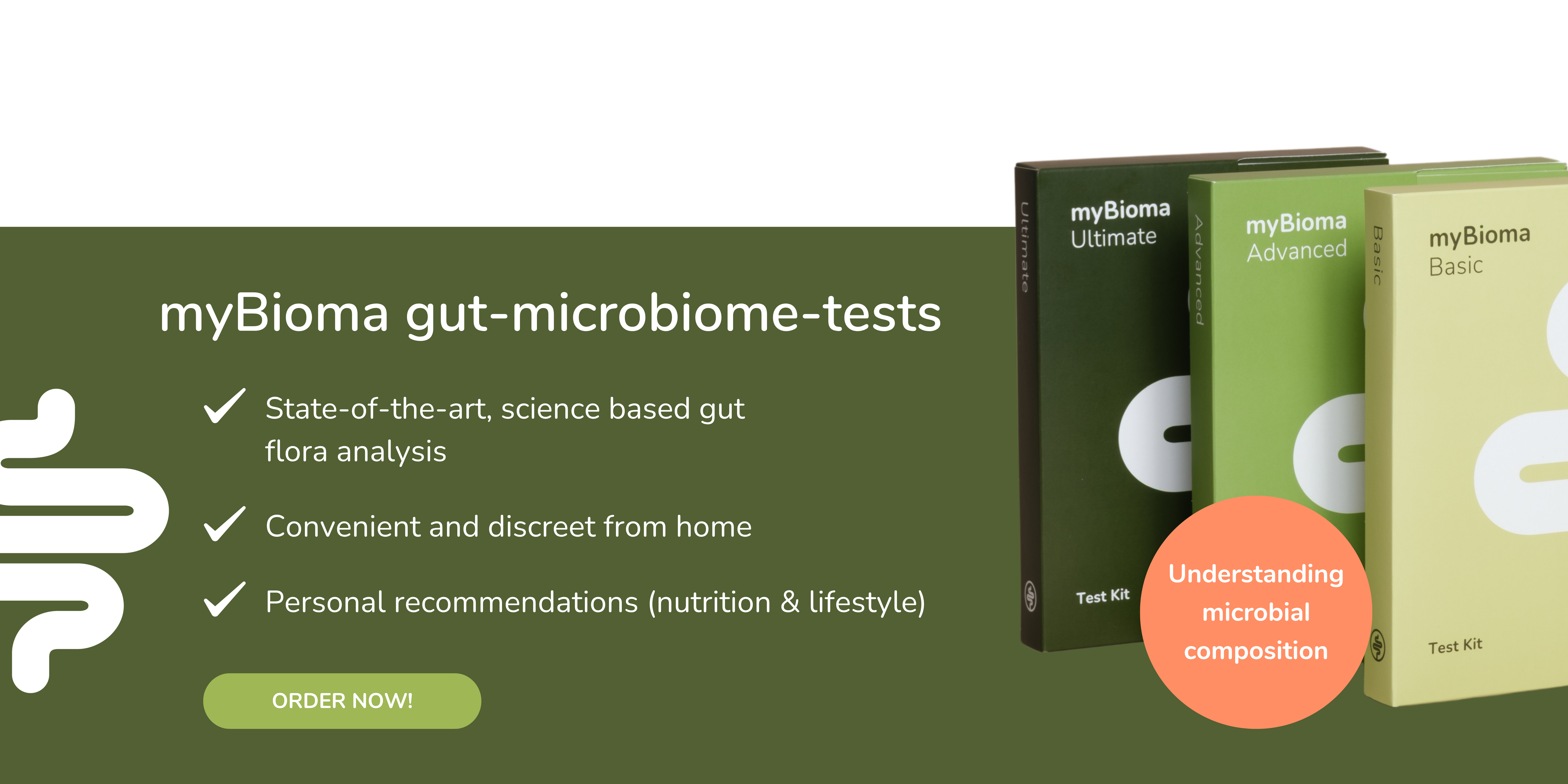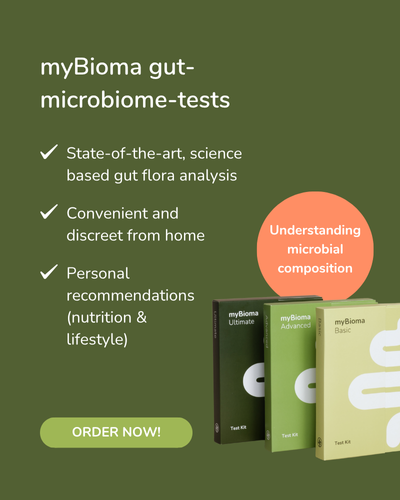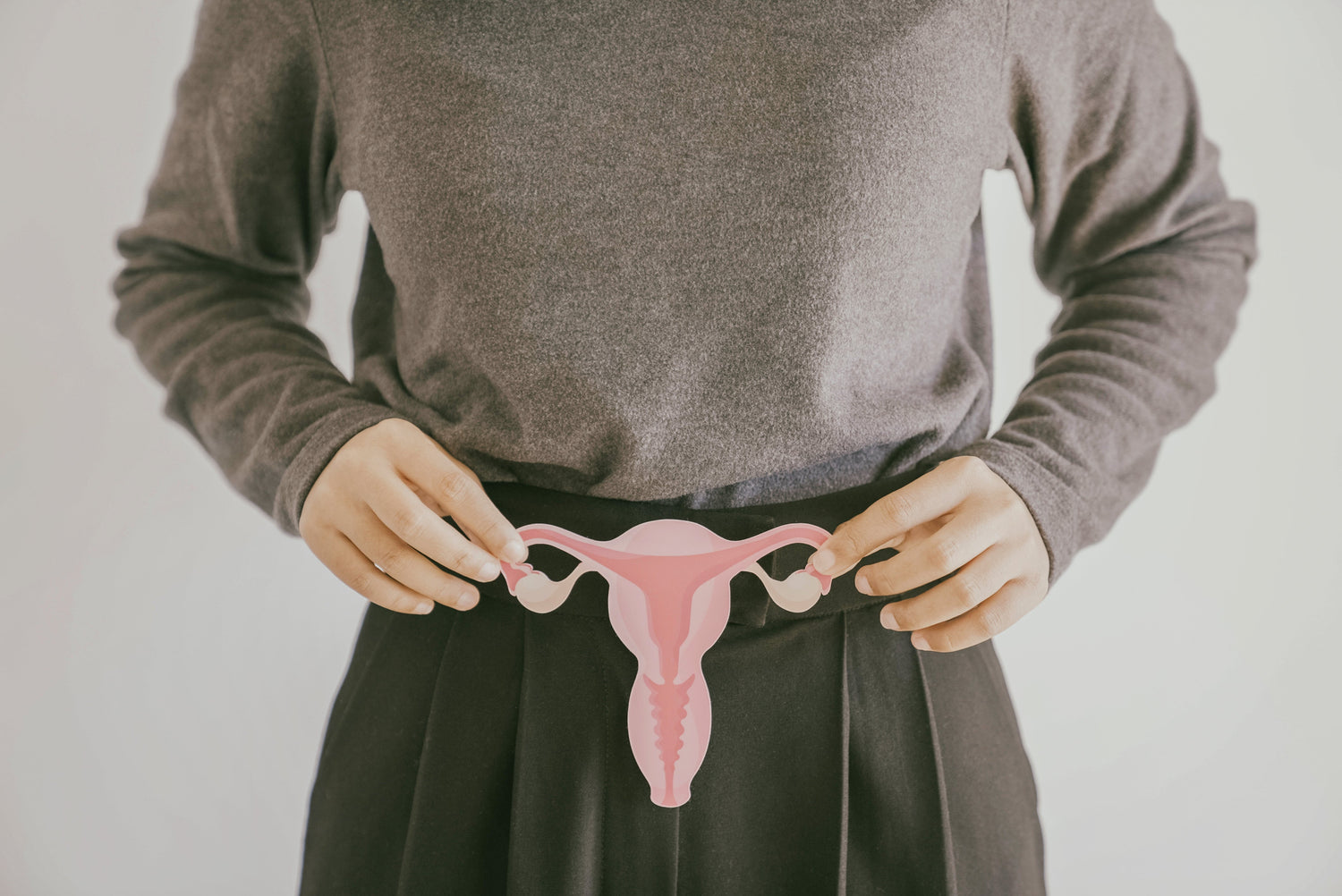Table of contents
- This is how the female cycle naturally works
- How does the contraceptive pill work in the body?
- Advantages and disadvantages of the pill at a glance
- How hormones influence the gut microbiome
- Birth control pill and chronic inflammatory bowel disease
- The contraceptive pill and irritable bowel syndrome
- The influence of the pill on the vaginal microbiome
- What alternatives are there to hormonal contraception?
- What should you pay attention to when choosing the pill?
- How to support your body while taking the pill
- Conclusion & key takeaways
The gut microbiome interacts closely with many organs and bodily functions. It influences not only digestion, but also the immune system, hormone regulation, and even our mood. Conversely, the hormonal system also influences the gut. Since millions of women worldwide take hormonal contraceptives like the pill, the question arises: How does the pill affect the microbiome—and what does this mean for gut health?
This is how the female cycle naturally works
The female cycle lasts an average of 28 days and is roughly divided into three phases:
-
Menstrual phase (days 1–5): The uterine lining is shed – the period begins.
-
Follicular phase (days 1–14): An egg cell matures in the ovaries, and under the influence of estrogen, the uterine lining rebuilds.
-
Ovulation and luteal phase (days 14–28): Ovulation occurs around day 14. Afterward, the body produces increased amounts of progesterone, which prepares the lining of the uterus for a possible pregnancy. If pregnancy doesn't occur, hormone levels drop, and the cycle begins again.
How does the contraceptive pill work in the body?
The birth control pill contains synthetic hormones—usually a combination of estrogen and progestin (artificial progesterone)—and specifically interferes with the natural cycle. It prevents ovulation, thickens the mucus in the cervix, and alters the lining of the uterus, preventing a fertilized egg from implanting.
It tricks the body into thinking it has consistently high hormone levels, which eliminates the natural fluctuations of estrogen and progesterone. The entire hormonal cycle is artificially suppressed. The monthly bleeding while taking the pill is therefore not a real period, but rather a withdrawal bleed caused by the pause in hormone delivery (1).

Schematic representation of the hormonal course in the female cycle – with and without taking a (combined) pill.
Differences - Mini-pill vs. Combined Pill
Basically, a distinction is made between the combined pill and the mini-pill – both variants are available in numerous versions and brands, which may differ slightly in their composition and mode of action (2):
-
Combined pill: Contains estrogen and progestin. It reliably suppresses ovulation, alters the uterine lining, and makes the cervical mucus impermeable to sperm. Combined pills are usually taken for 21 days, followed by a seven-day break or by taking hormone-free pills – during this time, a so-called withdrawal bleed occurs.
-
Mini-pill: Contains only progestin. It doesn't always reliably suppress ovulation, but it does work as a contraceptive by thickening cervical mucus and altering the lining of the uterus. Mini-pills are taken continuously without a break.
Advantages and disadvantages of the pill at a glance
Taking oral contraceptives can have both benefits and potential side effects. It's important to remember that every body reacts differently – how well the pill is tolerated varies greatly from person to person and cannot be predicted in general terms (1,3):
Advantages:
- Very safe method of contraception
- Less menstrual discomfort
- Cycle regulation
- Therapy for endometriosis and premenstrual syndrome (PMS)
- Improvement of the skin's appearance in cases of acne and hirsutism (excessive body hair in women)
- Reduced risk of ovarian and endometrial cancer
- Suppression of functional ovarian cysts
Possible risks:
- No protection against sexually transmitted infections
- Increased risk of thrombosis, stroke and heart attack
- Side effects such as breast tenderness, nausea, headaches
- Weight gain, water retention
- Disorders of libido and sexual dysfunction
- Increased risk of breast and cervical cancer
- Potential influence on mood, depressive symptoms
- Possible influence on intestinal health and immune system (e.g. autoimmune diseases)
The pill and its effects on our brain
Oral contraceptives are used by over 100 million women worldwide and suppress the body's production of hormones such as progesterone by up to 97%. Since hormonal fluctuations during the menstrual cycle, pregnancy, or menopause strongly influence the brain, it stands to reason that hormonal contraception also has an impact on the brain. Particularly critical is that many women begin using hormonal contraception during adolescence — a phase when the brain is still developing. However, there is still a lack of well-founded studies that adequately examine the long-term effects on mood, cognitive ability, and brain structure (4).

The hormones contained in the pill can affect the intestines.
How hormones influence the gut microbiome
The microbiome consists of billions of bacteria, fungi, and other microorganisms that live in close symbiosis with the human organism. They aid digestion, strengthen the immune system, produce vitamins, and even influence the central nervous system (gut-brain axis).
Hormones play a regulatory role in this complex microbiome world. The hormones estrogen and progestins – which are used in oral contraceptives – also influence the intestinal flora. For example, these two hormones are able to specifically promote or inhibit certain types of bacteria. As a result, taking the pill can indirectly lead to changes in the composition of the microbiome – a process that can have long-term health consequences. Conversely, however, the bacteria present in the intestine also influence how the hormones are metabolized, recycled, or broken down. Using oestrogen as an example: There’s a specific group of microbes involved in oestrogen metabolism – this is known as the estrobolome. It can produce oestrogens and influences how they act in the body. That means your gut microbiome also plays a role in how the pill works for you – and, to some extent, how well you tolerate it (5,6).
What do studies show about the pill and gut microbiota?
Medications are usually not explicitly tested for their effects on the intestinal flora. Thus, the effects of the pill on the intestinal microbiome have so far been little researched.
A study published in 2025 showed that certain gut bacteria are more common in women who take birth control pills than in non-users. These include Lachnospiraceae, Barnesiella and Faecalibacterium. Despite these differences in composition, no significant change in bacterial diversity was found between the two groups. However, a decrease in species diversity was observed in users on day 21 of the cycle. This suggests that the gut flora in these women changes slightly over the course of the cycle, presumably due to the hormonal influence of the pill. These changes are not necessarily negative, but they do make it clear that the hormonal control caused by the pill can also influence the microbial colonization of the intestine.
Other studies, in contrast, describe a decrease in bacterial diversity due to the use of the contraceptive pill. One long-term study, in particular, indicates a decrease in alpha diversity over time (1).
This important area of science requires further studies to make precise statements about the impact of the pill on the gut microbiome. Controlled studies with large numbers of participants, as well as long-term studies, are particularly limited.
Curious about how your gut is really doing? The myBioma gut microbiome tests give you exciting insights into your microbiome.
For more information on application, evaluation, and tips for your intestinal health, visit our website: https://mybioma.com/
The influence of oral contraceptives on digestion
Taking the pill can indirectly affect digestion because it alters natural hormone levels, which are closely linked to bowel function. Many women report increased digestive problems such as bloating, constipation, or abdominal pain in connection with the pill.
One possible reason for this is the increased levels of estrogen and progesterone, which can, among other things, slow bowel movements. This can lead to a feeling of fullness, abdominal pressure, or even constipation and bloating (7).
If the pill also alters the delicate balance of the intestinal flora, this can also have a noticeable impact on digestion. Some gut bacteria produce methane or hydrogen. This is completely normal and important – but if these bacteria get out of control, for example, due to taking the pill, digestive problems can arise (1).
This is especially true in women with pre-existing gastrointestinal complaints or functional disorders of the digestive tract. Taking the pill can lead to the development of such symptoms or worsen them.

The pill and the intestinal microbiome influence each other.
Birth control pill and chronic inflammatory bowel disease
Estrogen can weaken the protective function of the intestinal mucosa, which can lead to increased inflammation – similar to leaky gut, where the intestinal mucosa also becomes more permeable and inflammatory processes occur. Studies show that women who take combined pills (containing estrogen and progestin) over the long term have a higher risk of chronic inflammatory bowel disease – especially if there is a genetic predisposition. With progestin-only pills (mini-pills), in contrast, the risk of ulcerative colitis is barely increased. However, the exact relationship between hormone type, dose, and duration of use has not yet been sufficiently researched (8).
The contraceptive pill and irritable bowel syndrome
Whether oral contraceptives such as the combined or mini-pill increase the risk of irritable bowel syndrome has not yet been conclusively established scientifically. The development of irritable bowel syndrome is considered multifactorial - meaning it is influenced by a variety of factors, some of which are still not fully understood. Hormonal influences also play a role. However, according to current knowledge, the pill on its own is not considered a direct cause of irritable bowel syndrome (9).
What is striking, however, is that women are almost twice as likely to be affected by irritable bowel syndrome as men. One possible explanation for this is the female sex hormones estrogen and progesterone, which, among other things, influence bowel movements. Since many pills contain precisely these hormones, taking them could have both a positive and a negative effect on typical irritable bowel symptoms such as diarrhea, constipation, bloating, or cramps. Some women report an improvement in their symptoms while taking the pill, while others find them worse. Preparations that are taken without a break (usually mini-pills) in particular seem to provide relief for some sufferers (10).
But can irritable bowel syndrome also impair the effectiveness of the pill? In rare cases, yes: Since the pill is absorbed through the digestive tract, severe diarrhea - especially within two to three hours of taking it - can interfere with absorption. This may result in incomplete contraception.
The influence of the pill on the vaginal microbiome
Not only can the gut microbiome be altered by taking the pill, but the oral contraceptive also has an impact on the vaginal microbiome: The vaginal flora is primarily dominated by lactobacilli, which create an acidic environment and thus protect against pathogens. Taking the pill can support this protective function – however, studies also show that certain types of pills can lead to a decrease in the important lactobacilli and increase the risk of bacterial vaginosis and fungal infections (11, 12).
Once again, the gut comes into play: a healthy gut microbiota can help support the vaginal flora and reduce the risk of bacterial vaginosis. How does that work? Bacterial vaginosis is often linked to a lack of protective lactobacilli in the vagina. Interestingly, the gut serves as a kind of reservoir for these beneficial bacteria. Through the so-called estrobolome – the gut bacteria involved in oestrogen metabolism – lactobacilli can travel from the gut to the vaginal area and help maintain microbial balance there. Studies show that specifically supporting lactobacilli in the gut can also have a positive effect on vaginal health (13).

In addition to hormonal contraceptive methods, there are also various contraceptives that do not require hormones.
What alternatives are there to hormonal contraception?
Not every contraceptive method has to interfere with the hormonal balance – there are a number of effective, non-hormonal alternatives that can be considered depending on your life situation and needs (14):
Sterilization (permanent)
Sterilization can be performed on both women and men. In women, the fallopian tubes are severed so that no egg can reach the uterus. In men, a vasectomy involves severing the vas deferens, preventing sperm from entering the ejaculate.
→ These procedures are very safe, but usually permanent and difficult to reverse.
Copper IUD (long-term)
The copper IUD is inserted into the uterus. The copper it contains impedes sperm movement, thus preventing fertilization. The IUD lasts between five and ten years and can be removed at any time if necessary.
→ The copper IUD is very reliable, but can increase menstrual bleeding.
Barrier methods
Condoms not only protect against pregnancy but also help prevent sexually transmitted diseases. The diaphragm or cervical cap sits over the cervix as a protective barrier and is often used in conjunction with a spermicide - a substance that blocks or immobilises sperm.
→ Barrier methods are only truly safe when used correctly, but they also protect against communicable diseases.
Chemical agents
Spermicides, usually applied as creams, prevent sperm from moving or simply kill them. Phexxi gel changes the pH level in the vagina, making the environment less inviting for sperm and making it harder for them to move.
→ These methods are usually only used in combination with other contraceptive methods because their safety is limited.
Natural methods
With natural contraceptive methods, such as the temperature method, your cycle is closely monitored to better identify fertile and infertile days. This allows you to plan or avoid sexual intercourse to prevent pregnancy naturally.
→ Natural methods require some practice and are relatively complex, but offer contraception without hormones or devices.
What should you pay attention to when choosing the pill?
There are various pills available, each with a slightly different hormone composition. Which pill is right for you depends primarily on three factors: your health, how well you manage to take it regularly, and whether you're looking for long-term contraception (2). It's best to consult your gynecologist about this.
1. Does the pill fit your health profile?
Not all pills are equally suitable for every woman. You should avoid combination pills (containing estrogen and progestin) if, for example, you:
-
are over 35 and smoke
-
suffer from high blood pressure, migraine with aura or thrombosis
-
have heart problems or are very overweight
-
are currently breastfeeding (within the first 6 weeks after birth)
In such cases, a pure progestogen pill (mini-pill) is more suitable – it does not contain estrogen and is usually better tolerated (2).
2. Do you have any symptoms that could be alleviated by the pill?
For certain conditions, a combined pill can sometimes be beneficial. The estrogen can help stabilize hormone levels and alleviate symptoms. The combined pill may be a better choice for the following conditions (2):
-
painful periods
-
PMS
-
Acne
-
PCOS
-
Endometriosis
3. How regularly do you manage to take the pill?
Depending on the type of pill, the time of day you take it is crucial for its effectiveness:
-
Mini-pills: here the intake time is very strict (often ±3 hours)
-
Combination pills: the most flexible – taking the pill up to 24 hours late is usually not a problem
If you have trouble remembering to take your pill at the same time every day, a combined pill (if medically appropriate) or a longer-term contraceptive (e.g., hormone patch, ring, IUD) may be more practical (2).

Comparison of the two types of contraceptive pills in terms of risk, intake and usage.
How to support your body while taking the pill
Taking oral contraceptives can put additional strain on your body and slightly reduce the absorption of key nutrients – making it all the more important to support your body during this time and ensure it gets everything it needs (15):
1. B vitamins
The pill can lower blood levels of folate, B6, and B12 - therefore, it's especially important to ensure adequate intake of these vitamins. They are important for cell division, nerve, and hormonal health, among other things.
➡️ Foods: green leafy vegetables, legumes, avocado, whole grains, eggs
2. Magnesium & Zinc
These two minerals are necessary for over 600 bodily functions – including energy production, nerve function, and the immune system. Taking the pill results in an increased need for magnesium and zinc.
➡️ Sources: nuts, lentils, meat, seafood, green vegetables
3. Vitamin D
The pill can negatively impact vitamin D metabolism and promote vitamin D deficiency. Therefore, pay particular attention to ensuring you get enough vitamin D.
➡️ Sources: fatty fish, egg yolk, sun, possibly supplements
4. Antioxidants
The pill can increase oxidative stress in the body and thus have a negative impact on the health of your cells. Therefore, pay particular attention to ensuring you get enough vitamins C and E, as well as secondary plant substances like polyphenols.
➡️ Focus: fruits, berries, vegetables, nuts, green tea
5. Hydration & movement
Hormones such as estrogen and progesterone influence the body's water and salt balance. This can lead to water retention. Drinking enough fluids (about 2–2.5 liters per day) and regular exercise help the body better regulate fluid and electrolytes and prevent swelling.
6. Intestinal supportive diet
To prevent digestive problems and support your intestines while taking the contraceptive pill, ensure you consume sufficient pre- and probiotic foods and eat a varied, diverse diet.
➡️ Sources: oat flakes, leeks, chicory, yogurt, sauerkraut, kefir

This is how you can support your body while taking the pill.
Conclusion & key takeaways
The contraceptive pill not only affects hormone levels – it also influences other areas of the body, including the gut microbiome and metabolism.
For many women, it's a reliable and practical method of contraception, but in recent years it's also come under increasing criticism due to its potentially negative health effects. Whether to use the pill or not is a completely individual decision and should be medically discussed. In any case, it's worth keeping an eye on the potential effects on your overall health and supporting your body as best as possible if you take it regularly.
A balanced diet, targeted nutrient intake, good intestinal health, and a conscious approach to one's own body can help counteract potential side effects and support well-being. 🧡
References
- Terrazas, F., Kelley, ST, DeMasi, T., Giltvedt, K., Tsang, M., Nannini, K., Kern, M., & Hooshmand, S. (2025). Influence of menstrual cycle and oral contraception on taxonomic composition and gas production in the gut microbiome. Journal of Medical Microbiology, 74(3). https://doi.org/10.1099/jmm.0.001987
- Dr Brenda, Ikeji. (2025, June 14). What is the Best Contraceptive Pill for Me? https://www.zavamed.com/uk/best-contraceptive-pill.html
- Barbara Bartlinka & Geovanni Espinosa. (2018). Integrative Sexual Health (1st ed.). Oxford University Press.
- Taylor, CM, Pritschet, L., & Jacobs, EG (2021). The scientific body of knowledge – Whose body does it serve? A spotlight on oral contraceptives and women's health factors in neuroimaging. Frontiers in Neuroendocrinology, 60, 100874. https://doi.org/10.1016/j.yfrne.2020.100874
- Hua, X., Cao, Y., Morgan, DM, Miller, K., Chin, SM, Bellavance, D., & Khalili, H. (2022). Longitudinal analysis of the impact of oral contraceptive use on the gut microbiome. Journal of Medical Microbiology, 71(4). https://doi.org/10.1099/jmm.0.001512
- d'Afflitto, M., Upadhyaya, A., Green, A., & Peiris, M. (2022). Association Between Sex Hormone Levels and Gut Microbiota Composition and Diversity—A Systematic Review. Journal of Clinical Gastroenterology, 56(5), 384-392. https://doi.org/10.1097/MCG.0000000000001676
- Judkins, TC, Dennis-Wall, JC, Sims, SM, Colee, J., & Langkamp-Henken, B. (2020). Stool frequency and form and gastrointestinal symptoms differ by day of the menstrual cycle in healthy adult women taking oral contraceptives: a prospective observational study. BMC women's health, 20(1), 136. https://doi.org/10.1186/s12905-020-01000-x
- Pasvol, TJ, Bloom, S., Segal, AW, Rait, G., & Horsfall, L. (2022). Use of contraceptives and risk of inflammatory bowel disease: A nested case–control study. Alimentary Pharmacology & Therapeutics, 55(3), 318–326. https://doi.org/10.1111/apt.16647
- Kimberly Malone Crossley. (2024). Birth control and IBS: everything you need to know. The Lowdown. Health hub. https://thelowdown.com/blog/ibs-and-the-pill
- Sharon Liao. (2023). Do Your Hormones Affect IBS? WebMD. https://www.webmd.com/ibs/hormones-ibs
- Krog, MC, Hugerth, LW, Fransson, E., Bashir, Z., Nyboe Andersen, A., Edfeldt, G., Engstrand, L., Schuppe-Koistinen, I., & Nielsen, HS (2022). The healthy female microbiome across body sites: Effect of hormonal contraceptives and the menstrual cycle. Human Reproduction, 37(7), 1525-1543. https://doi.org/10.1093/humrep/deac094
- Bakus, C., Budge, KL, Feigenblum, N., Figueroa, M., & Francis, AP (2023). The impact of contraceptives on the vaginal microbiome in the non-pregnant state. Frontiers in Microbiomes, 1, 1055472. https://doi.org/10.3389/frmbi.2022.1055472
- Siddiqui R, Makhlouf Z, Alharbi AM, Alfahemi H, Khan NA. (2022). The Gut Microbiome and Female Health.Biology;11(11):1683.
- Howard, S.A., & Benhabbour, S.R. (2023). Non-Hormonal Contraception. Journal of Clinical Medicine, 12(14), 4791. https://doi.org/10.3390/jcm12144791
- Laura Kunces, PhD, RD, CSSD. (2025). Best Supplements During Birth Control Pill. THORNE online.








2 comments
Hallo Mona,
vielen Dank für deinen wertvollen Beitrag und dass du deine Erfahrungen mit uns teilst! Es ist unglaublich spannend, welchen Einfluss Hormone auf die Verdauung und den Darm haben können.
Alles Liebe,
Evelyn von myBioma
Danke für den Beitrag.
Ich hatte kmmer einen „schnellen“ Darm doch ab 39 formte sich das auf töglich 3-4x mit starken Blähungen. Es wurde immer schlimmer. Daneben wirden die PMDS Symtome stärker. Seit ich die Slinda (Gestagen) nehme und nun weiss das meine Östrogendominanz, welche auch Perimneopausal kommen kann, dafür verantwortlich war, habe ich ein neues Leben & einen neuen Darm.
Und dank eurer Analyse weiss ich auch wie gut es meinem Darm geht.